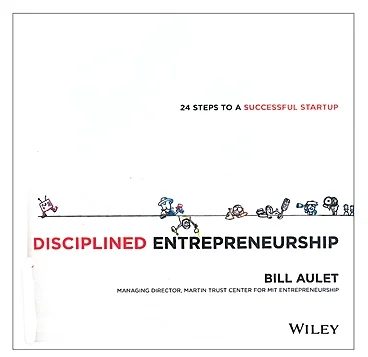Disciplined Entrepreneurship: 24 Steps to a Successful Startup
Finally started tackling the reading list for my upcoming MIT Bootcamp. I started with listening to the Disciplined Entrepreneurship on Audible. The book was a good choice because it covered a lot of basics, including terminology I was not familiar with or had forgotten. I am not going to do a full review; there are plenty of those on the web. Instead, I want to highlight three points that stood out to me.
Firstly, the book exists because the writer, Bill Aulet, believes that you can learn to be an entrepreneur. The idea that you can learn to be an entrepreneur is not something universally acknowledged. We, humans, are prone to mythologisation and so naturally, successful entrepreneurs a turned into myths. You also have people in the entrepreneurial space who talk about entrepreneurs as a people apart. Now I am not saying that some people don't have the personality to be more inclined to go down the entrepreneurial path. The truth remains that anyone can learn to the skills to be an entrepreneur and often, it is circumstance, and not personality, that dictates who does and does not become an entrepreneur. But personality might indicate who becomes a serial entrepreneur.
Secondly, the author expressed the belief that you don't have a business unless someone pays you something for your goods or services. E.g. he didn't consider Instagram a business until Facebook bought it. While this might seem a bit extreme in the age of platforms and apps, I have to agree with him. Take for example something like Tumblr. It was a very successful microblogging platform that attracted people active on various fandoms and as well as people making original content. However, they didn't have a monetisation strategy and Yahoo, which bought Tumblr, has had a rough time trying to monetise it. The reason being that "fandom" isn't always advertiser-friendly, and fans can be very entitled. Trust me on this; I would be sending DC comics hate mail on a regular basis if I wasn't so easily Googlable. So it is a fair point to say that you don't have a business until someone is willing to pay you.
Lastly, I was intrigued by what the book had to say about the competition. The author suggested that while we should be aware of the competition, focusing on them, especially trying to crush others in the market is not the way to go. The suggestion was that if you create a new market or industry through your innovation, both you and your competition can thrive. But if you focus too much on the competition, you end up losing to the bigger enemy: the status quo! I support this idea wholeheartedly. A lot of things in life is not a zero-sum game. For you to win, someone else doesn't have to lose. You can win together.
Overall, I enjoyed the book and learnt a lot. I am looking forward to completing the other books on the reading list.

